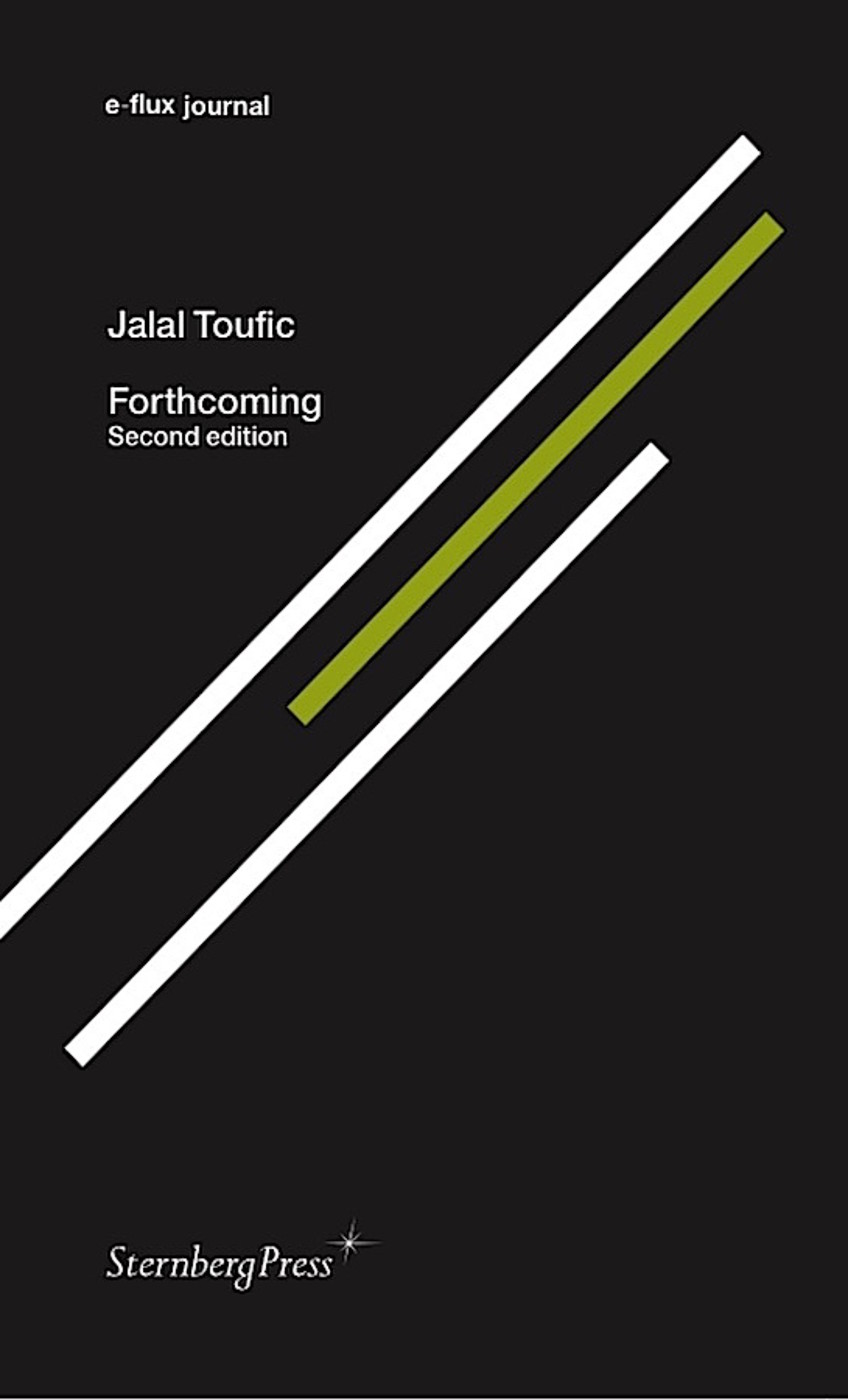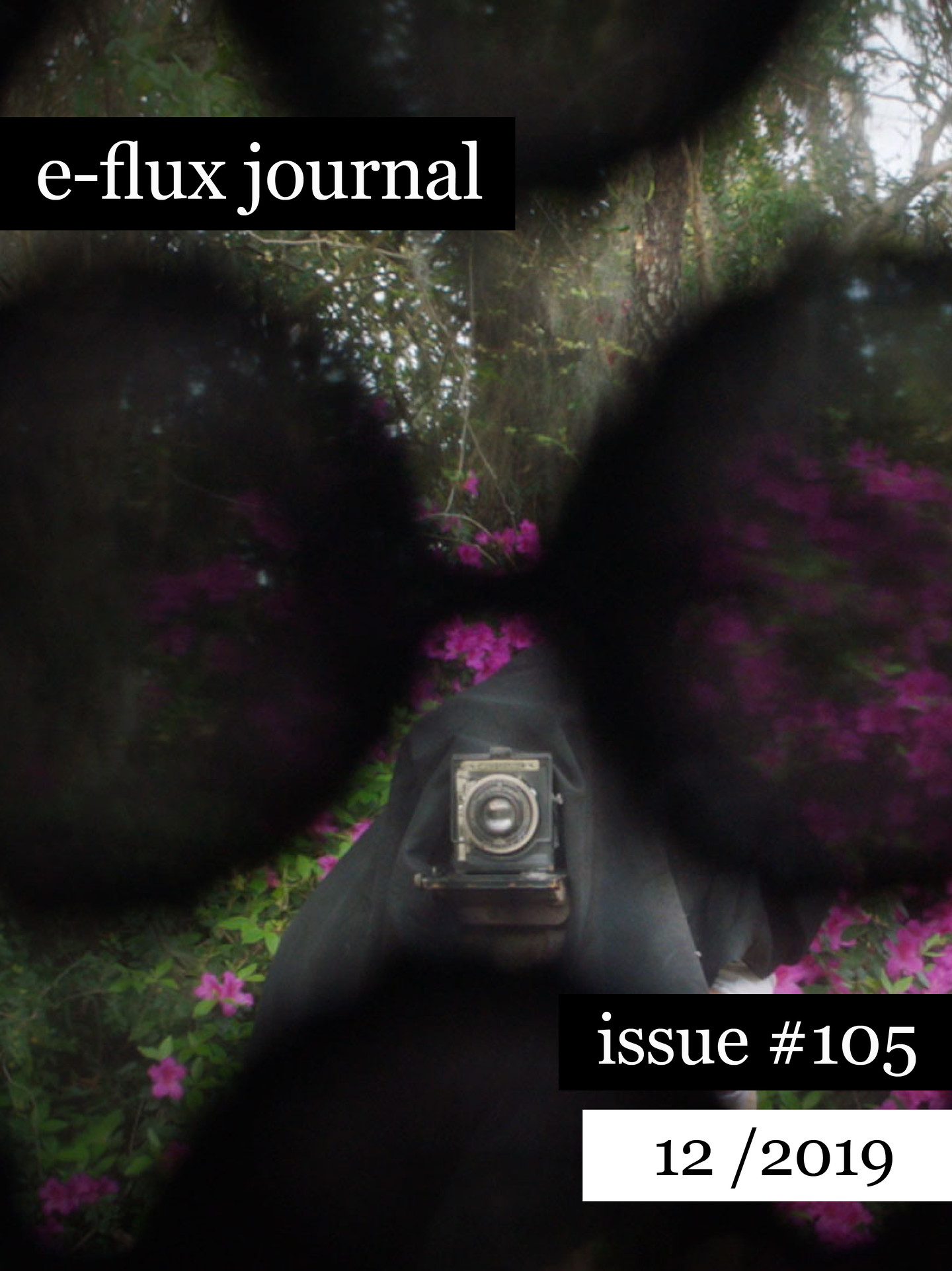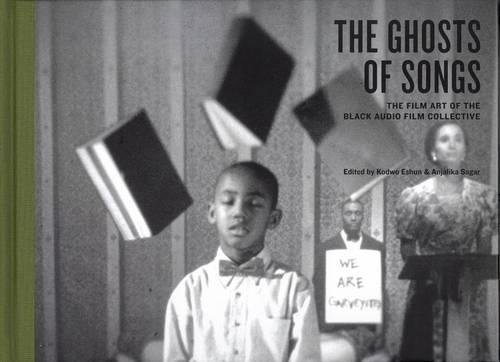Jalal Toufic: Forthcoming (2000/2014)
Filed under book | Tags: · aesthetics, art, artists writing, film

“Jalal Toufic is a thinker whose influence in the Beirut artistic community over the past two decades has been immense—notwithstanding that, as he put it, many, if not all of his books, most of which were published by Forthcoming Books, ‘continue to be forthcoming even after their publication.’ In relation to one of these books, he wondered: ‘Does not a book titled Forthcoming suggest, ostensibly paradoxically, a second edition?’ Here’s the revised edition of Forthcoming, a book first published nearly a decade and a half ago by Atelos press.” (Series editors Julieta Aranda, Brian Kuan Wood, Anton Vidokle)
“I once wrote, ‘I am not able to find my thoughts without passing through his [Jalal Toufic’s] words, books, and concepts.’ Now, eight years later, things seem to have gotten worse (or better). Jalal wrote in Distracted: ‘— Are you saying this to me? — Also to myself. One should speak solely when also speaking to oneself. Only then is there a dialogue.’ I can also think of the following situation: ‘— Are you saying this to me? — Yes. And not to myself. And only to you.’ Or an instance in which the following is heard: ‘— Are you saying this to me? — Also to myself. One should speak solely when also speaking to oneself. Only then is there a duologue.’” (Walid Raad)
First published by Atelos, Berkeley, CA, 2000.
Second edition
Publisher Sternberg, Berlin, 2014
e-flux journal series
ISBN 9783956790553, 3956790553
296 pages
Interview with author (Aaron Kunin, Rain Taxi, 2001).
Review: Publishers Weekly (2001).
Author
Editors
Publisher
WorldCat
e-flux journal, 105: Loophole of Retreat (2019)
Filed under magazine | Tags: · art, black people, feminism, film, poetry, race, women

“On April 27, 2019, the Solomon R. Guggenheim Museum was the site of a very special convening. It was the brainchild of Simone Leigh, and shared its title with her 2019 exhibition at the museum. Organized by Leigh, Saidiya Hartman, and myself, ‘The Loophole of Retreat’ was an exhilarating, rejuvenating, and inspirational daylong gathering dedicated to the intellectual life of black women that brought together an international constellation of writers, artists, poets, filmmakers, and activists. This special issue of e-flux journal seeks to lift up the extraordinary voices, thoughts, and conversations that emerged at the convening and share them with a wider audience. In doing so, I and my coeditors, Leigh and Hartman, seek to extend the dialogues of the ‘Loophole’ in the hope of including others and inspiring future gatherings which, like the Guggenheim convening, will honor and celebrate the intellectual and creative labor of black women.” (Tina M. Campt)
Contributions by Simone White, Sharifa Rhodes-Pitts, Rizvana Bradley, Dionne Brand, Zakiyyah Iman Jackson, Christina Sharpe, Vanessa Agard-Jones, Grada Kilomba, Françoise Vergès, Denise Ferreira da Silva, Okwui Okpokwasili, Lorraine O’Grady, Annette Lane Harrison Richter, Madeleine Hunt Ehrlich, and Asiya Wadud.
Edited by Tina Campt, Saidiya Hartman, and Simone Leigh
Publisher e-flux, New York, Dec 2019
ISSN 2164-1625
Kodwo Eshun, Anjalika Sagar (eds.): The Ghosts of Songs: The Film Art of the Black Audio Film Collective, 1982-1998 (2007)
Filed under book | Tags: · art, black people, film, video, video art

“The Ghosts of Songs is the first book-length exploration of the work of the Black Audio Film Collective. The collective, founded in 1982 and dissolved in 1998, comprised John Akomfrah, Lina Gopaul, Reece Auguiste, Avril Johnson, Trevor Mathison, Edward George and David Lawson, and for sixteen years their films addressed the social, political and racial crises of Thatcher’s Britain and beyond. However, it would be limiting their achievement to see them either as merely challenging the hegemonic forms of mass media, or conversely as polemicist film activists. In films such as Expeditions, Handsworth Songs, Seven Songs for Malcolm X and Twilight City, the collective explored and developed a black film aesthetic. The essays in this volume, contributed by Jean Fisher, Kodwo Eshun, Kobena Mercer and Okwui Enwezor, argue that they inaugurated themselves as an artist-group, laying claim to the right to reconfigure the space of cinema around the Afrodiasporic subject, reconceptualizing lighting, film stock, developing and printing, and inventing the forms that black cinema might take.”
Publisher Liverpool University Press, and FACT, Liverpool, 2007
Changing Media, Changing Europe series
ISBN 1846310148, 9781846310140
239 pages
Exh. review: Josephine Berry Slater (Mute, 2007).
Review: Alexandra M. Kokoli (The Art Book, 2008).
PDF (62 MB)
Comment (0)
